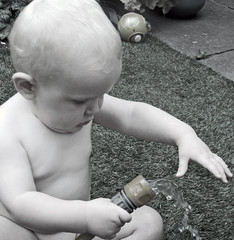The same machine was in use all through my childhood. So I remember the constant run of the hose pipe and my grandfather moving the hose throughout the day to water the shrubs out the front, the tomato plants, the watermelon patch and the drifts of cannas. But best of all, we grandkids could play with the hosepipe as much as we wanted - and the water was warm. Not the best for drinking, but great for splashing around in and filling paddling pools (except on the very hottest of days).
It was so warm, in fact, my grandfather rigged up a little shower system on the back porch, and screened from the traffic of Springer Road by overgrown hedges, we could bathe outside at night.
There must have been other such systems in existence, but I don't remember hearing about them and I certainly haven't heard of any others like that now. When the unit had to be replaced in the mid 80s - a normal air conditioner was installed. No more warm water eternally on tap.
Kids like hosepipes though, no matter what the temperature. We stripped Buddy down in the garden yesterday (yes, a little of the edge of the sub-arctic chill of British summer has finally melted off) and let him play with the hose.

It's not that hot though, and the water from the hose is cold. We saw him sucking in his tummy from the freezing water and his flesh was cool to the touch. Still, he kept playing. But I wished he could have experienced that warm water hosepipe.
1 comment:
http://www.sedo.energy.wa.gov.au/pages/evapor.asp
That was an evaporative air conditioner, I think. Sometimes called a swamp cooler.
Much more efficient in dry climates, and often preferred in places like Australia. It surprises me a little that the cooler worked in a humid climate like Tennessee.
It's much more energy efficient at high temperatures than a normal refrigerated unit. That's why Australian cities tend not to have such problems with brownout at the height of summer.
Also much more comfortable. An evaporative system doesn't dry out the air like a normal air conditioner does.
Post a Comment